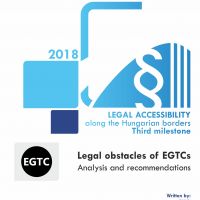
- Author: dr. Tamás Balogh and CESCI
- Territory: Carpatian space
- Year of publication: 2018
- Type: Study
- Language: Hungarian
- Number of pages: 162
The establishment of cross-border health services (Legal Accessibility: Third milestone) (HU)
In the framework of one of the sub-projects of the third milestone of the Legal accessibility project, CESCI continued its work launched in recent years in the field of cross-border health integration. The study, made with the involvement of co-author Dr. Tamás Balogh, focuses on summarising the professional work performed in 2018.
The document discusses the patients’ rights ensured by EU and national legislations and the EU-level regulatory framework, as well as the existing Western-European models in order to explore how and under what conditions cross-border service areas could be established with the participation of Hungary and Hungarian hospitals.
The study attempts to review the legal and health economy regulatory frameworks, among which a cross-border service system could be established and operated, in an organised and controlled manner.
The study contains the evaluation of the survey addressing local governments and hospitals along the border, the summary of the interviews conducted in four hospitals and the experiences of the study trip bringing the regional actors together
In addition, the document contains the comprehensive analysis of a leading expert appointed by CESCI including the legal framework and European practices of cross-border patient mobility, demonstrating the evolution of the relevant sectoral EU regulation (up until the cross-border patients’ rights directive of 2011), the relevant Hungarian legislations (the internal legislations, the bilateral agreements in operation with the neighbouring countries and the results of the adoption of EU regulations), and the legal framework of the funding issues related to cross-border services.
The examination also summarises the results of two previous examinations (from 2005 and 2011) and addresses the project-level funding issues, and those aiming at individual care.

